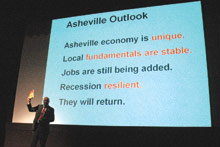Despite the longest-running financial panic in the U.S. since the Great Depression, Asheville and its strong health-services and tourism sectors continue to see sustained economic growth, two economists said Thursday night.

“The local fundamentals are still stable,” Tom Tveidt, director of the Asheville Metro Business Research Center, told a group of about 250 people gathered in Diana Wortham Theatre for an annual economic update. The center is part of the Asheville Area Chamber of Commerce.
“We still have job growth here,” Tveidt said. “We are recession-resilient, not [recession-]proof.”
National expert James F. Smith, chief economist for Parsec Financial Management and a professor at Western Carolina University’s Institute for the Economy and the Future, joined Tveidt in painting a mostly upbeat economic picture, or at least a glass-half-full view of what’s happening.
Asheville’s economy continues to be powered by 51 straight months of record-setting job growth through the first half of 2008, Tveidt said, with 3,700 new net jobs added over the past year. There’s been a decline in home sales and home construction, but annual home-appreciation rates remain strong at 4.5 percent, he said.
Tveidt broke down Asheville’s strongest economic sectors: industry serving new residents, professional and business services, manufacturing, health services and tourism.
Asheville ranks as a regional hub for health services, which has been up every year since 1990 and provides a major boost to wages in the area. The industry sees low turnover in its employee ranks, with women between the ages of 34 and 55 accounting for 57 percent of its workforce.
“It’s one of those industries—perhaps the only one—that is recession proof,” Tveidt said.
The tourism sector added the most jobs of any over the past year, Tveidt said, but it’s more flexible. An economic-research firm predicts only a small increase in leisure travel, declining business travel and less spending on restaurants, he said, which could hurt the local economy. Hotel and motel occupancy rates were down this spring, the first decline since 2004.
Restaurant jobs account for 80 percent of growth in this sector, Tveidt said, noting that 40 percent of restaurant employees are under age 24. “If there’s one industry where you want to cut workers, this is it,” he said.
Tveidt framed the area’s population growth in terms of the housing industry. Locally, home values started declining about 16 months after the decline hit Florida. That’s key because the largest chunk of Asheville’s in-migrants—12 percent—hail from the Fort Lauderdale/Boca Raton and West Palm Beach communities, Tveidt said. In Asheville, the median home price is down 2 percent, but the full impact of what’s happened in the Florida real-estate markets has yet to be felt in Asheville, he said.
The manufacturing and professional-services sectors fill out the local economy in different ways, he explained. Manufacturing jobs continue to decline, but wages have been increasing in a sector that has pockets of strength in plastics, machinery and electronics. The professional-services sector is an emerging source for new jobs and has added almost 25 percent of the new net jobs for the area since 2006.
Smith provided the big-picture view of the economy, noting that the current financial panic started in August 2007 when a French bank, which had much of its money tied up in U.S. sub-prime mortgages and similar financial instruments, refused to redeem shares for its customers. “That triggered it, and it hasn’t stopped,” he said.
Pessimistic economic forecasts see 1 to 1.5 percent growth in the U.S. economy over the next four or five years, Smith said, compared to a recent average of about 3 percent growth. That slow rate of growth hasn’t happened since the Great Depression, he said.
Americans have a low tolerance for such stagnation and will likely vote in a new batch of politicians who will try their hand at the economy, Smith said. And on the bright side, Americans love to shop.
“The good news is people will tell you they feel miserable, and to make themselves feel better, they’ll go shop,” Smith said.
Visit www.mountainx.com/xpressfiles to see Tveidt’s slide presentation and a summary of his talk.



According to tourist arrival data from UNWTO the inbound travel to the United States remained strong and contributed a lot to the growth seen in the North American region. Even if Americans will most likely travel less due to the economic downturn, other nationalities will still travel to US to see the original Disney Land and Hollywood.
The tourism sector added the most jobs …. yeee-ha!
Lets all sign up for minimum wage (or less) service industry jobs!
if you can find one of those even! i have put in over 50 job applications and resumes in the past 5 weeks- nothing. So where are all of these mystery jobs?
Indeed LOKEL & lindsey, the city needs to step it up a notch so far as recruiting potential industries of future sustainability work force that will allow Asheville to continue thriving after gasoline hits $6/gallon. We are {currently} recession resilient, not immune.
Getting fair-wage blue, white, and green collared jobs in this region needs to become a major priority. Otherwise, as history has taught us during the last major economic downtown of significant impression, tourism is the first thing to go when the budgets start to crunch.